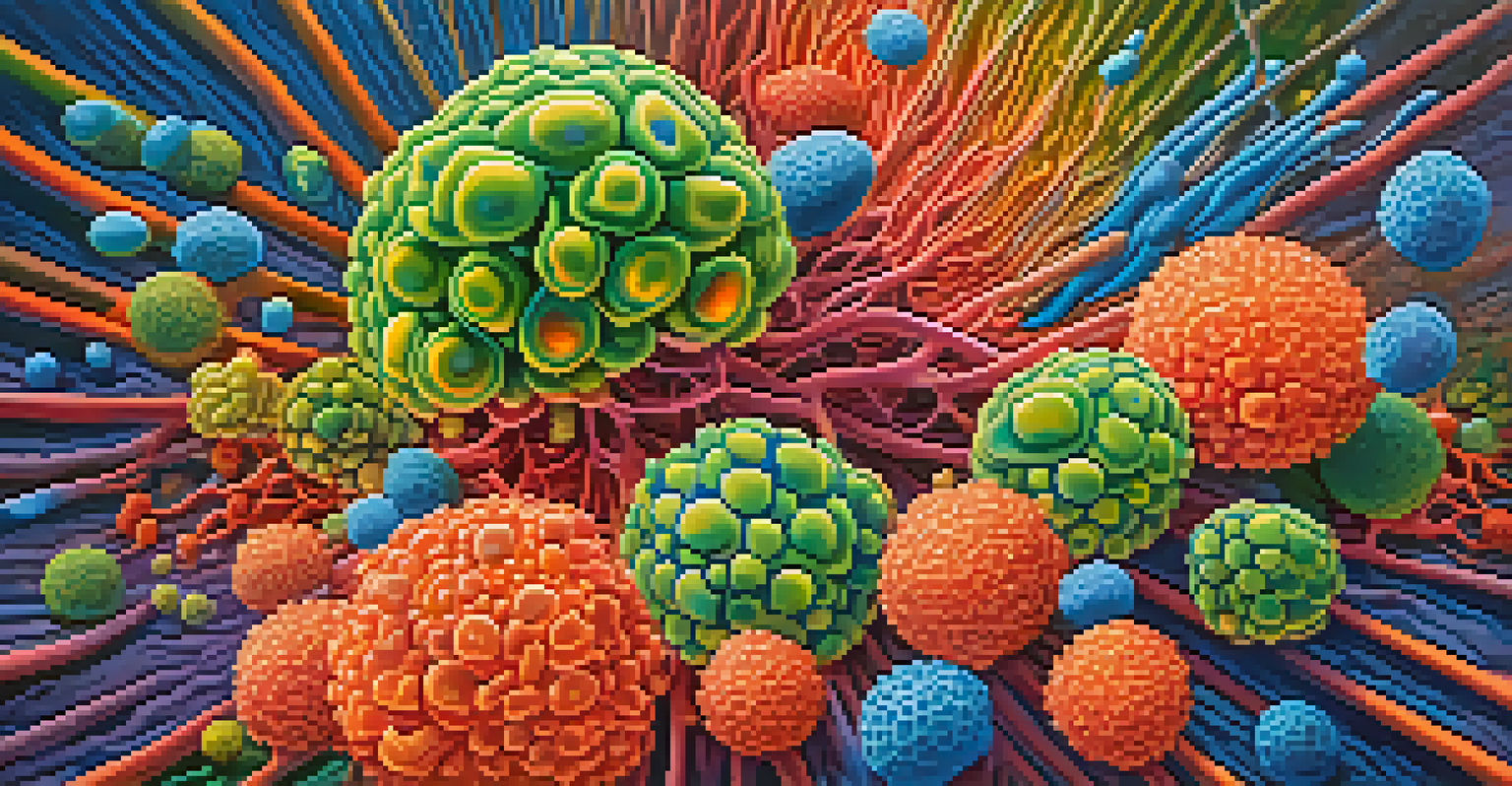Immunotherapy: Revolutionizing Cancer Treatment Approaches

Understanding Immunotherapy and Its Mechanism
Immunotherapy harnesses the body's own immune system to fight cancer. Unlike traditional treatments like chemotherapy or radiation, which target cancer cells directly, immunotherapy aims to boost or restore the immune system's ability to recognize and attack tumors. This innovative approach can lead to more effective and long-lasting responses in some patients.
Immunotherapy is a promising new approach to the treatment of cancer, offering hope to patients who previously had few options.
At its core, immunotherapy includes various strategies such as monoclonal antibodies, checkpoint inhibitors, and cancer vaccines. For instance, checkpoint inhibitors work by blocking proteins that prevent immune cells from attacking cancer cells, effectively unleashing the immune response. By understanding how these methods work, we can better appreciate their potential.
The excitement around immunotherapy stems from its ability to turn the tide in cancer treatment. While not every patient responds to it, for those who do, the results can be remarkable—leading to prolonged remissions and improved quality of life. This paradigm shift in treatment underscores the importance of ongoing research in this field.
Types of Immunotherapy: A Closer Look
There are several types of immunotherapies available today, each designed for specific cancer types and patient needs. Monoclonal antibodies, for example, are engineered proteins that can bind to specific targets on cancer cells, marking them for destruction by the immune system. This precise targeting helps minimize damage to healthy cells, which is a common concern with traditional therapies.

Another exciting category is checkpoint inhibitors, which help the immune system recognize cancer cells as threats. Drugs like pembrolizumab (Keytruda) and nivolumab (Opdivo) have shown great promise in treating melanoma and lung cancer, offering new hope to patients who previously had limited options. These therapies have become a cornerstone in the treatment of several malignancies.
Immunotherapy: A New Cancer Frontier
Immunotherapy boosts the immune system to fight cancer, offering a promising alternative to traditional treatments.
Lastly, there are cancer vaccines, which stimulate the immune system to attack cancer cells. For instance, the HPV vaccine not only prevents cervical cancer but is also being studied for its therapeutic potential in existing cancers. Each type of immunotherapy has its unique approach, but they all share the goal of empowering the immune system.
Benefits of Immunotherapy Over Traditional Treatments
One of the standout benefits of immunotherapy is its ability to provide long-lasting protection against cancer. Unlike chemotherapy, which often requires continuous treatment, immunotherapy can sometimes lead to a durable response where the immune system continues to recognize and attack cancer cells even after treatment has ended. This can significantly improve overall survival rates.
The future of cancer treatment is in immunotherapy, which has the potential to change the way we think about and treat this disease.
Additionally, immunotherapy typically has fewer side effects compared to traditional treatments. Patients often report a better quality of life during treatment, as common side effects like nausea and fatigue are less prevalent. This gentler approach allows individuals to maintain their daily activities and enjoy time with family and friends.
Moreover, immunotherapy can be used in conjunction with other treatments, creating a more comprehensive approach to cancer care. Combining immunotherapy with chemotherapy or radiation can enhance the overall effectiveness, providing a multi-faceted attack on the disease. This collaborative strategy is helping to redefine how we approach cancer treatment.
Challenges and Limitations of Immunotherapy
While immunotherapy offers incredible promise, it’s not without its challenges. One of the primary hurdles is that not all patients respond to these treatments, and the reasons why remain unclear. Researchers are actively working to identify biomarkers that can predict which patients are most likely to benefit from immunotherapy, but this is still an evolving area of study.
Additionally, some patients experience immune-related side effects, which can occur when the immune system inadvertently attacks healthy tissues. These can range from mild to severe and may require additional treatments to manage. This highlights the importance of close monitoring during treatment.
Success Stories Inspire Hope
Numerous patients have experienced life-changing results from immunotherapy, demonstrating its potential when other treatments fail.
There’s also the challenge of accessibility and cost. Immunotherapies can be expensive, and not all healthcare systems provide equal access. Addressing these disparities is crucial to ensure that all patients have the opportunity to benefit from these groundbreaking treatments.
Current Research and Future Directions
The field of immunotherapy is continuously evolving, with researchers exploring new strategies to enhance its effectiveness. Ongoing clinical trials are investigating combination therapies, such as pairing immunotherapy with targeted therapies or radiation. These studies aim to identify the best ways to maximize patient responses and minimize side effects.
Additionally, there is exciting work being done in personalized immunotherapy, which tailors treatments based on individual patient profiles. By understanding a patient’s unique genetic makeup and tumor characteristics, scientists hope to create customized treatments that are more effective and have fewer side effects. This personalized approach could revolutionize cancer treatment.
Furthermore, the expansion of immunotherapy beyond traditional cancer types is a significant focus. Researchers are investigating its potential in treating diseases like multiple myeloma and even non-cancerous conditions. This exploration could open new avenues for treatment, making immunotherapy a vital tool in modern medicine.
Real-Life Success Stories with Immunotherapy
Immunotherapy has already begun to change lives, with numerous success stories emerging from patients who have undergone this treatment. For instance, some melanoma patients have experienced remarkable responses, with tumors shrinking or even disappearing entirely, leading to years of remission. These inspiring outcomes highlight the potential of immunotherapy to provide hope where traditional treatments have failed.
Another compelling example is the story of a lung cancer survivor who turned to immunotherapy after exhausting other options. After receiving checkpoint inhibitor therapy, the patient saw significant improvement in their condition, allowing them to return to their normal life. Such anecdotes serve as powerful reminders of the transformative impact of this treatment.
Future: A Holistic Treatment Approach
The future of cancer treatment lies in integrating immunotherapy with other modalities for a more personalized and effective strategy.
These success stories not only uplift those undergoing treatment but also inspire researchers and healthcare professionals to continue their work in immunotherapy. They remind us that behind every statistic is a person whose life has been changed, fueling the drive for continued innovation and improvement in cancer care.
The Future of Cancer Treatment: A Holistic Approach
As we look to the future, it's clear that a holistic approach to cancer treatment will be essential. Immunotherapy should be seen as a part of a larger treatment plan that may include surgery, radiation, and traditional chemotherapy. This integrated care model allows for a more personalized approach, addressing the unique needs of each patient.
Moreover, there’s an increasing focus on preventive measures and early detection in the fight against cancer. By understanding risk factors and implementing screening programs, we can potentially catch cancers earlier when they are most treatable. Education and awareness will play a crucial role in this preventative strategy.

Ultimately, the future of cancer treatment lies in collaboration—between researchers, healthcare providers, and patients. By working together and leveraging the strengths of various treatment modalities, we can create a more effective and compassionate approach to fighting cancer, ensuring that no one faces this battle alone.